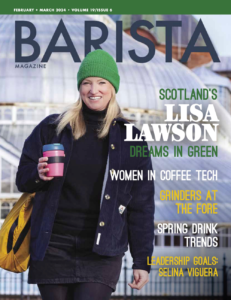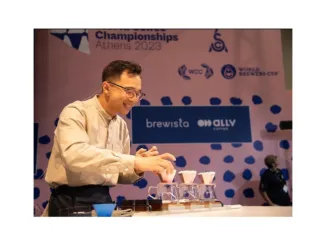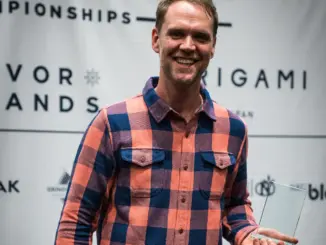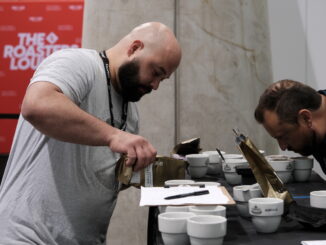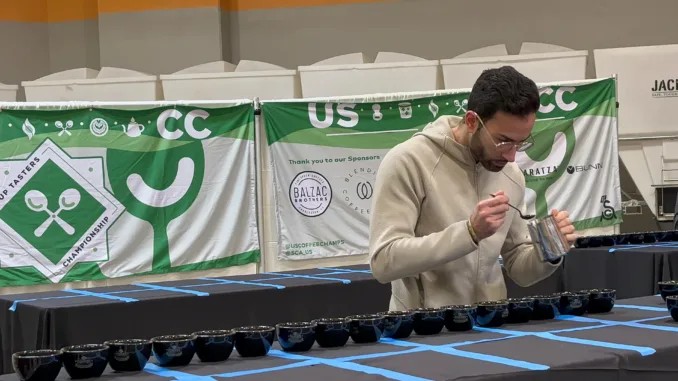
We talk to the new U.S. Cup Tasters Champion about his passion for competition and coffee, training for success, and more.
BY CHRIS RYAN
BARISTA MAGAZINE ONLINE
Featured photo courtesy of Memli Coffee Lab
Soon after Mehmet Sogan got interested in coffee, he sought out the competition stage.
Living in the United Kingdom and France before relocating to the United States, he took part in AeroPress competitions and Brewers Cup contests before discovering the Cup Tasters competition in 2017. (In the Cup Tasters event, competitors receive eight sets of three cups—or triangles—with two cups identical and one different. The competitor who identifies the different cup the most times—and in the shortest amount of time—wins.)
Competing in the U.S. Cup Tasters Championship, Mehmet reached the semifinals in 2022 in Boston, and again in 2023 in Portland, Ore. But at the 2024 U.S. Cup Tasters Championship, which took place in Rancho Cucamonga, Calif., earlier this month, Mehmet had a different result: He relied on his palate and some wise strategic decisions to take home the title of 2024 U.S. Cup Tasters Champion.
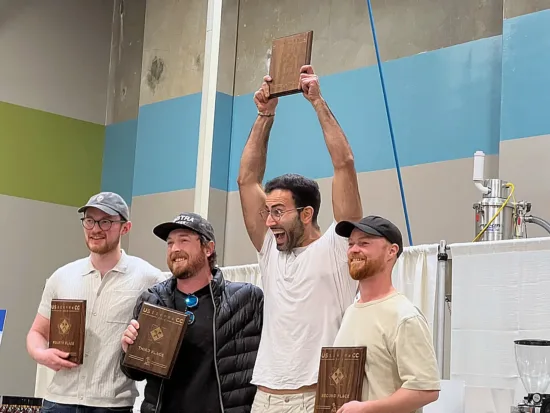
Mehmet, who owns Memli Coffee Lab in San Marcos, Calif., with his wife and competition coach, Linh, will now advance to the 2024 World Cup Tasters Championship, taking place April 12-14 in Chicago during the Specialty Coffee Expo.
We talked to him about discovering coffee, preparing for Cup Tasters, and much more.
This interview has been edited for length and clarity.
Barista Magazine: Can you please describe a bit about your journey into specialty coffee?
Mehmet Sogan: Coffee was part of my life from a very early age. My parents fled the civil war in the Middle East in the ’80s and went to Paris, where I was born. Coffee was always this bitter thing I didn’t like much, but it was a moment of gathering.
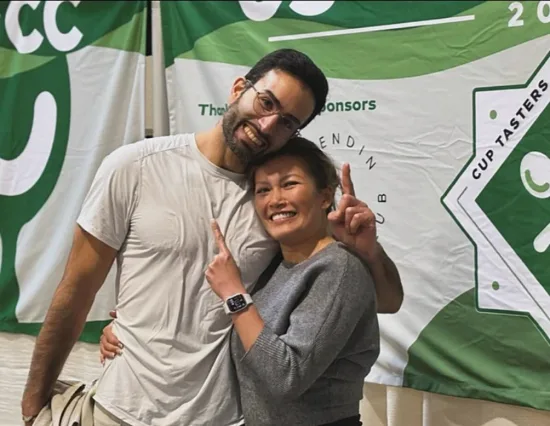
My background before getting into specialty coffee was in engineering and thermodynamics. I started working as an engineer in Tampa, Fla.; that’s where I started drinking Folgers with hazelnut creamer. It reminded me of Nutella, which I grew up on in Europe. That was a big moment for my interest in sensory experiences, and how flavors help remind us of memories and emotions.
One of my biggest passions is to travel, meet people, and learn about culture. So I went from Mexico to Argentina by bus, and I stopped in Colombia for about six months. I stumbled upon a specialty-coffee tasting, and for the first time I didn’t have to add anything to my coffee. That sparked my interest.
So that led to you soon leaving engineering to work in specialty coffee and start your company, Memli Coffee Lab?
Yes, after two years of travel I spent all the money I had saved, so I went back to my engineering job, but this time in London, U.K. I also started doing a lot of SCA training, mostly in sensory, and I started teaching about specialty coffee. I also met my now-wife, Linh, who is from the U.S., so we moved back to be closer to family.
I was balancing my coffee career with my engineering career in London, but when we arrived in the U.S., we decided to bring all the culture and the style of coffee we learned in London to create Memli Coffee Lab, which is basically an extension of our life, values, and principles. Our goal is “helping people taste coffee mindfully,” and we do that through quality coffee, transparency, and education.
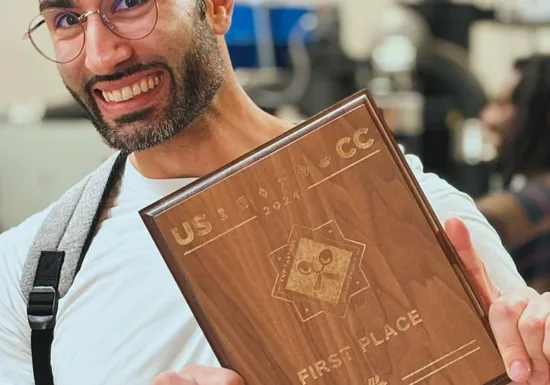
How did you and Linh prepare for this year’s competition?
Our main training was triangulation, organized through levels of difficulty. The first level is different coffee, different origin, different process—more general, a little easy. Then we have the same country but different region and different variety. Then it will be the next level with some countries and regions, but different varieties. So a little bit more precise. And then it will be the same everything but different roasts. That training regime was quite strict; I wouldn’t advance to the next level if I didn’t master at least four rounds on the previous level.
In the semifinal, you got seven out of eight cups correct, but you took the most time of any competitor. For the finals, you were by far the fastest competitor, and again got seven out of eight. What changed with your strategy there?
I put a lot of pressure on myself for the semifinal round because that’s where I had failed before. Everyone’s strategy is to score eight out of eight. And in the semifinal, I took my time, I think over 5:30. I knew I just had to score eight—but I didn’t, I scored seven. So the final was 90 minutes later, and I knew I had to change my strategy. I had done my best to get eight out of eight, and I didn’t. So now I needed to hit time and hope that someone else missed one.
For the finals, my idea was to go with my first intuition and push the cups forward, and to have fun. I knew I probably wouldn’t score eight, but I thought I could score seven while being very fast. And I finished in 2:23, I think—faster than in any of my training. I got seven correct and I was the fastest, so I won.
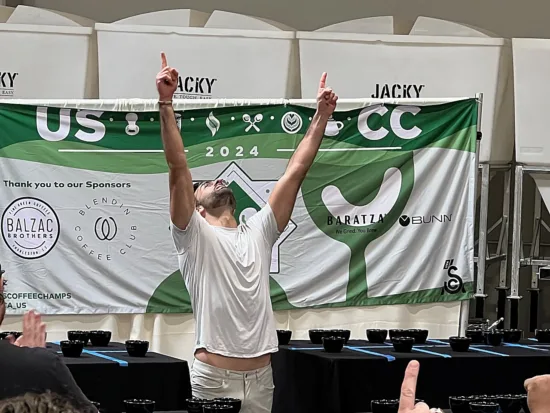
Can you describe what it felt like to you to win the event?
At about the fifth set in finals, I knew I was going fast and doing well, and I almost knew I won for some reason. That’s probably the other important thing I learned is to believe you can win. Because if you believe you cannot win, guess what, you won’t win. But if you believe you can win, maybe you can. And so when I won, it was of course a happy moment. At first I couldn’t believe it; for seven years of competing, I built resilience and got used to not being first. So when you win something for the first time, you don’t know how to act. I was just happy and humble.
Finally, how are you feeling about the World Cup Tasters Championship, which is next month in Chicago?
I feel pretty good. We do continuous training, so we have the offseason, the preseason, and the competition season—it’s more intensive in different seasons, but basically I haven’t stopped training since 2022. So now I’m doing more difficult training for the World level, which is beneficial not just for training but also in terms of stress management and being on stage again—the more I’m on stage, the less anxiety I have. I’m getting used to it, and now I actually enjoy being at those tables with those 24 coffees in front of me.
Subscribe and More!
Out now: It’s the February + March 2024 issue of Barista Magazine! Read it for free with our digital edition. And for more than three years’ worth of issues, visit our digital edition archives here.
You can order a hard copy of the magazine through our online store here, or start a subscription for one year or two.

